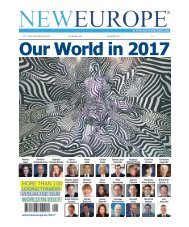Our World in 2018
Leading minds reflect on the state of our societies, and examine the challenges that lie ahead. An edition dedicated to generating ideas that will help form a new vision for our world.
Leading minds reflect on the state of our societies, and examine the challenges that lie ahead. An edition dedicated to generating ideas that will help form a new vision for our world.
You also want an ePaper? Increase the reach of your titles
YUMPU automatically turns print PDFs into web optimized ePapers that Google loves.
OUR POLITICAL SOCIETIES
Will the Center Hold?
By Lawrence Summers
The most important question facing
the United States – and in many
ways the world – after the events of
2017 is this: Will Yeats’ fearful prophecy that
“Things fall apart; the center cannot hold”
come true? Will it continue to seem that “The
best lack all conviction while the worst are
full of passionate intensity”? It is hard not to
be concerned, but it is too soon to anticipate
failure.
The US now has a president who regularly
uses his Twitter account to heap invective
on leaders of nuclear-armed states, the
American news media, members of his own
cabinet, and religious and racial minorities,
while showering praise on those who traduce
the values of democracy, tolerance, and
international law.
Countries such as China, Russia, Turkey,
and Saudi Arabia are more authoritarian,
more nationalist, and more truculent on the
world stage than they were a year ago. And
then there is the surely more belligerent and
possibly more erratic leader of North Korea, a
country on the brink of developing the ability
to deliver nuclear weapons at long range.
Europe also faced trials in 2017. Aside from
the United Kingdom’s decision to proceed with
its withdrawal from the European Union, the
far right won seats in the German Bundestag
for the first time in decades, and far-right
parties and candidates did better than ever
in a number of European elections. In mid-
November, 60,000 people marched through
Warsaw demanding a “White Europe.”
So there is plenty of passionate intensity.
And much of it is directed at the traditions
and understandings that have made the
last several decades the best in human
history, in terms of living standards,
minimization of premature and violent death.
Will things stay together? Can some kind
of center hold? Financial markets offer a
Lawrence H.
Summers
Lawrence H.
Summers, US
Secretary of the
Treasury (1999-
2001) and Director
of the US National
Economic Council
(2009-2010), is a
former president of
Harvard University,
where he is
currently University
Professor.
remarkably optimistic view. The US stock
market has broken one record after another
in the year since Donald Trump’s election as
president, while indicators of realized stockmarket
volatility and of expected future
volatility are at very low levels by historical
standards. And some stock markets around
the world have done even better.
While high equity prices and low volatility
may seem surprising, they likely reflect
the limited extent to which stock-market
outcomes and geopolitical events are
correlated. For example, Japan’s attack on
Pearl Harbor, the assassination of President
John F. Kennedy, and the 9/11 terrorist attacks
had no sustained impact on the economy. The
largest stock-market movements, such as the
1987 crash, have typically occurred on days
when there was no major external news.
Stock markets are buoyant because they
comprise individual companies, and, to a
have been both rising and predictable. How
is a risk that investors are increasingly taking
on leverage or pursuing strategies – such as
contemporary versions of portfolio insurance
– that will cause them to sell if markets
decline. It is worth remembering that, looking
back, markets do not appear to have been
remarkably bubbly prior to the 1987 crash.
There is also the question of financial
.
far better capitalized and far more liquid than
they were prior to the crisis, market indicators
of risk suggest we may not be quite as far
out of the woods as many suppose. Despite
apparently large increases in capital and
consequent declines in leverage, it does not
appear that bank stocks have become far less
capital had become abundant.
Financial markets are widely cited,
including by US President Donald Trump, as
providing comfort in the current moment. But
120 2018 | OUR WORLD










